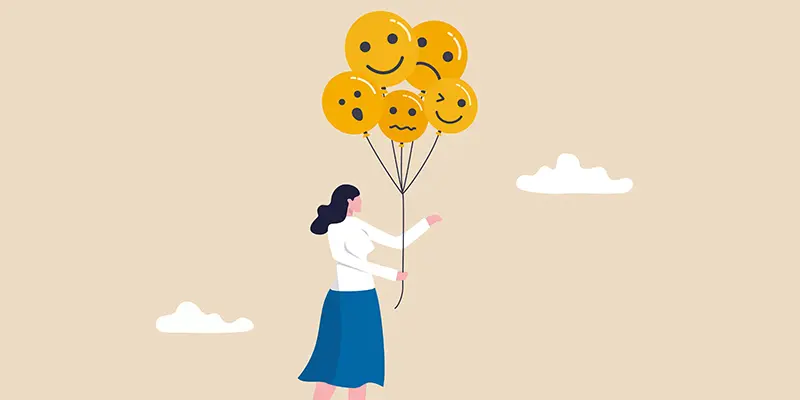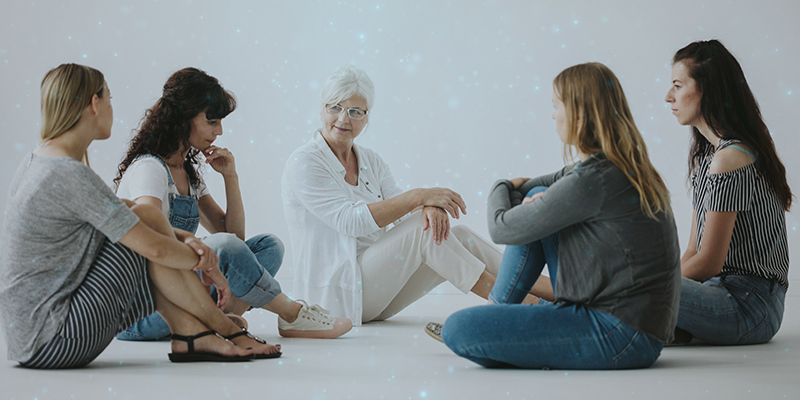
You’re out in the fresh air having one of the best hikes, swims, bike rides, golf games, or pickleball matches you can remember. The next thing you know, you feel a twinge. It could be in your knee, back, shoulder, hip, elbow, or foot, but it’s enough to make you cut your activity short and get home as soon as possible. You cross your fingers that you’ll make a quick recovery, but after a few days of rest and ice, the pain has gotten worse. You go to a doctor, who tells you to take time off from all exercise for at least one month. Ugh! When you’ve suffered a physical injury, the absence of exercise and all the feel-good properties that come from it can leave you feeling down and, according to research, could lead to depression.
When you’ve suffered a physical injury, the absence of exercise and all the feel-good properties that come from it can leave you feeling down and, according to research, could lead to depression. Click To Tweet5 WAYS PHYSICAL INJURY LEADS TO DEPRESSION
Some of the contributing factors involved with depression from lack of exercise due to an injury include:
1. Coping with physical pain.
Experiencing pain is distracting at best and can overtake your ability to function. You might find yourself in “survival mode,” just trying to get through each moment of the day without feeling excruciating pain. This, of course, is no way to live and can take not only a physical toll but a mental one. You might notice that you’re more irritable, less tolerant of normal daily stressors, less patient, and more on edge in general.
2. Missing out on the mental benefits of exercise.
A 2010 study in the Journal of Sport and Exercise Physiology suggests that physical activity boosts our moods. Exercise also supports our overall health and wellness and can even ward off Alzheimer’s disease and other memory issues as well as encourage the growth of new brain cells, ease ADD/ADHD symptoms, help with maladaptive addictive behavior, increase the quality of sleep and balance out hormonal changes. Feeling great from exercise is in part due to the impact it has on stress hormones such as adrenaline and cortisol, which decrease during a workout. Physical activity also increases endorphins that help reduce pain and elevate your mood. When you suddenly stop exercising, these important benefits stop as well.
3. Not getting the social bonding benefits.
Perhaps you play a team sport, enjoy one-on-one activities such as racquetball, or small group gatherings such as golf. No matter how many people are involved, missing out on the social connections made during exercise can be a huge loss and one that feels difficult—if not impossible—to fill in any other way.
4. Being stuck inside.
We need our Vitamin D, and not just in a capsule; being outdoors, and exposed to nature has tremendous mental health benefits. Data from a 2013 study show that outdoor exercise improves mental well-being and if your sport of choice means spending time outdoors, the loss of time in nature can be debilitating.
5. Decreased feelings of self-worth.
Deriving our self-worth from a variety of sources is important, and exercise can contribute to feeling great about yourself. A 2016 study in Neuropsychiatric Disease and Treatment suggests that physical activity is directly correlated to an increase in self-esteem. If you regularly set physical goals and work toward achieving them, you can feel a drop in your sense of value when you’re taken out of an exercise routine.
9 WAYS TO COPE WITH POST-INJURY DEPRESSION
Validating your feelings, knowing that they are a normal aspect of stopping exercise is important, but you don’t have to live this way indefinitely. There are effective coping tools that will lessen the negative emotional and mental impact of being laid out for a period of time. Here are nine tips for staying mentally strong while recovering from injury:
1. Stay social.
If your workouts involve other people, such as playing a team sport or even social running, tennis or golf, make plans to see your friends for lunch or enjoy spectator sports together while you’re healing. It might be tempting to socially isolate and watch television alone day after day, but by giving yourself a push to enjoy other people’s company can actually increase your pain tolerance by upping the level of pleasure and pain-relieving neurotransmitters that come from social interaction.
2, Engage in alternative movement.
If it’s safe to move your body without furthering your physical pain, do it. It might not be your regular physical activity, but if it won’t aggravate your injury then use this time to try new activities. Always check with your doctor first and if you get the green light, try something new. It could be as easy as walking around the block, swimming, or moving your upper body if you have a leg injury, for example. Or try more deliberate movement such as Qigong or yoga that can help relieve stress.
3. Exercise your mind.
Chronic pain can affect memory, so it’s important to keep your brain active. Crossword puzzles, reading, learning a new language, or watching interesting documentaries are all excellent brain exercises. Additionally, the mental distraction that focus and concentration provide can do wonders for your mood, as well as the gratification of accomplishing a goal such as finishing a jigsaw puzzle or speaking a second language more fluently.
4. Meditate.
In a 2008 study conducted on older adults who suffer from chronic pain, meditation was shown to significantly improve their mood, sleep, and ability to cope with pain, and even decrease their need for pain medication. This doesn’t mean you have to go to a two-week-long silent retreat; meditation can be practiced for as little as 10 minutes a day and still have a positive effect on your mood and ability to create calmness in the midst of feeling physical pain.
5. Journal.
Expressive writing is a well-researched tool that helps lower blood pressure, heart rate, decrease depressive symptoms, and increase feelings of acceptance and well-being. A 2018 article in Advances in Psychiatric Treatment supports the health benefits of expressive writing; even 15-20 minutes of writing a few times a week can help alleviate depression.
6. Set goals.
There is robust evidence that goal setting helps injured patients both psychologically and physically and is an integral part of the rehabilitation process. Work with your medical team to set physical goals for yourself as you heal from your injury, but also use this time to focus on other goals you may have put off. A template for planning how you will achieve your goals can help you along the way.
7. Seek support.
Given the dramatic change in your lifestyle, it could be necessary to seek extra support during this time. Keeping up with your social life and participating in fun, recreational activities is vital, but beyond that, you might feel the need to talk to friends about your condition and air out your feelings as you walk through this difficult time. Research shows that meaningful social connections improve mental health and decrease loneliness; just be sure to find safe connections where you can share openly about your emotions.
8. Eat well.
It might be tempting to reach for a giant pizza and your favorite sugar-filled chocolate bar while you’re recovering from an injury but be warned this can exacerbate feelings of depression and anxiety. Conversely, there are foods that can help boost your mood such as berries, lean protein, omega-3 fatty acid-rich foods, probiotics, dark leafy greens, and more. Stay on track with your nutrition and your mood, brain, and overall physical state will thank you for it.
9. Enjoy leisure activities.
Research published in the journal Leisure Sciences suggests that recreational activities such as listening to music, relaxing, and enjoying “downtime” are beneficial distractions from chronic illness and traumatic injury. Using time to lounge without having a specific activity or task helps people cope with the mental and emotional stress of physical injuries.
Depression and other mental health issues can’t wait. At Amen Clinics, we’re here for you. We offer in-clinic brain scanning and appointments, as well as mental telehealth, clinical evaluations, and therapy for adults, teens, children, and couples. Find out more by speaking to a specialist today at 888-288-9834 or visit our contact page here.





All of the nine points listed in the article are excellent advice. In senior living, during quarantine, all clubs and gyms were shut down for 2 years in our Arizona community. Similar depressions and weight gain resulted from isolation. Now that we are out and about again, many have shared their hesitancy to leave the comfort of their TV chairs and so many confess their brain fog and lack of energy. However, in the last 8 months, socialization has picked up, smiles have returned, exercise outdoors has huge turnouts (pickleball, swimming, golf, lawn bowling, walking), and weekend dances are packed. Tai Chi, Xi Gong and meditation is popular. We have become aware about the importance of nutrition. It's a relief to discover that we can improve as we age, instead of giving in to depression and anxiety.
Comment by Nancy — November 28, 2022 @ 6:12 AM
Great article. This sums me up. Constant headaches from car accident over a YEAR AGO. Got rear ended at a stop sign, whiplash and neck injury.
I'm a former competitive athlete so I'm trained to block as much pain as I can… however, I'm bitching and aggressive almost all the time. Listening to heavy metal while driving for me in trouble. As an ex racer, I'm the guy that SCARES NYC cab drivers ..
I don't want to be that guy, but pain can drive you crazy. I'm looking into surgery for a pain implant. I can't deal with this anymore.
I wish you guys took insurance, is be there yesterday. Sigh…one day I'll see you guys.
Stay well,
MJ
Comment by Michael James — November 29, 2022 @ 11:51 AM
useful tips… maybe, just maybe.. don’t list off all the negatives first. I hadn’t even considered some of that and now despite the tips i’m feeling more hopeless than before. could have given this advice better.
Comment by Karly — February 21, 2023 @ 6:20 AM
After a foot injury six weeks ago, I started feeling depressed and would cry due to the feeling of hopeless I found this article very helpful. I plan on trying some of the tips to hopefully help with the depression and get me through the next six weeks of recovery.
Comment by Sharon — July 23, 2023 @ 7:23 AM
A week ago I broke my arm – my wrist – and my life hasn’t been the same since. I was walking on the beach, barefoot, enjoying the feel of the water and sand, when I stepped on something slippery – a peace of concrete covered with moss – and fell. My life stopped. I’m in pain, and avoid taking painkillers because they make me sleepy and nauseous, but it’s the depression that is killing me. I read your tips and they all make so much sense, but when I’m down I don’t have the energy to pull myself together and do some of these things… Anyway, it helped me knowing that I am normal. Hope to feel better soon
Comment by Nora Gutberg — September 17, 2023 @ 12:04 AM
What Reason Hiring An SSA Ineptitude Advocate Can Be Crucial.
Enlisting The State Welfare Ineptitude Advocate Is Essential.
The Sensitive Social Aid Directs various programs from layoff benefits to welfare assistance, and also deals with incapacity remuneration for persons incompetent to carry out tasks due to long-term sickness or injury. As with all sophisticated body, there are laws and laws which must be complied with by the mentioned authority in organization to get beneficial outcomes. Looking to hire an expert Supplemental Security Income advocate Is often vital.
Employing a seasoned Social Security Disability counsel may aid you manage the complexities of Social Security Administration Services for Secure Aging, increasing your possibility of endorsement for benefits. They can ensure that your proposal is filed accurately and includes backing medical evidence; besides, they are aware of how to accumulate this evidence speedily so it is not presented late; moreover, they can prevent presenting irrelevant data that may trigger setbacks and dismissals by the Supportive Security Arrangement.
Your disability consultant will also get you ready you for a hearing with SSA if your claim is refused, by describing what to foresee at it and responding any of your doubts about what happens there. They could support with giving additional proof and inquiring the adjudicator who heard your lawsuit to review their determination and query witnesses or vocational experts called by SSA to testify on your behalf, which might improve the opportunity that an first appeal for disability is successful if at the outset denied. Social security disability attorneys can recover any past due perks due to changes in the starting date, which symbolizes when your state began. Effective champions for disabled individuals may guide with winning back any past due perks that would have been lost due to changes in the starting date or when your situation began.
https://disabilitysacramento.com/blog-list/page/2/ – Qualifying for Social Security Disability necessitates a thorough assessment of the severity of your health issues
https://disabilitysacramento.com/back-pain-and-disability-benefits/ – Qualifying for Social Security Disability benefits requires a comprehensive evaluation of your medical situation
Comment by Martintax — November 14, 2023 @ 3:37 PM